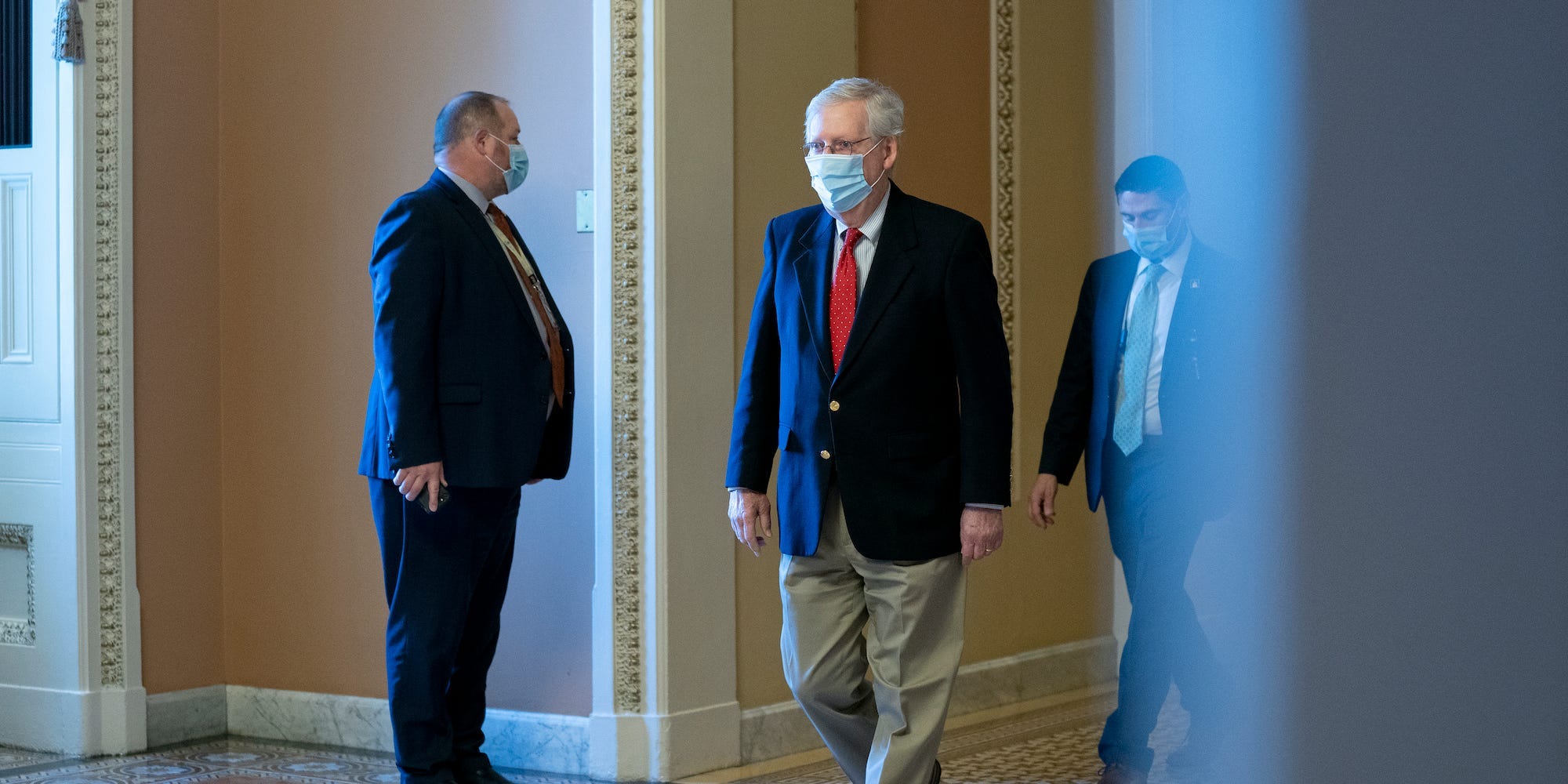
Photo by Stefani Reynolds/Getty Images
- The House of Representatives voted on Monday to increase stimulus checks from $600 to $2,000.
- This vote, coupled with President Donald Trump’s continued call for higher checks, and the upcoming Senate runoff races in Georgia put McConnell in a bind.
- A GOP win in Georgia may depend on whether the $2,000 stimulus checks make it through the Senate.
- Visit Business Insider’s homepage for more stories.
The House of Representatives voted on Monday to increase stimulus checks from $600 to $2,000. The measure now goes to the Senate where passage of the increased stimulus checks is largely in Senate Majority Leader Mitch McConnell’s hands.
If McConnell isn’t able to rally the GOP around supporting these new stimulus payments, it may cost Republicans Georgia’s runoff races in January – the results of which determine control of the Senate after the 2020 election cycle.
McConnell was initially opposed to a second round of stimulus checks.
House Democrats first passed a measure – the $3 trillion HEROES Act – that called for a second round of $1,200 checks in May. But McConnell declined to bring up that bill in the Senate, opting instead to try and pass a “skinny” stimulus package that did not include direct payments.
Negotiations before the November election stalled, and more than a month after the election, the House and Senate finally passed a $900 billion COVID-19 relief package that included $600 in direct payments.
McConnell has tied the relief package to the Georgia races in the past.
Two weeks ago, The New York Times reported that in private calls, McConnell described Sens. Kelly Loeffler and David Perdue - the GOP's two candidates in the Georgia runoffs - as "getting hammered" over an initial lack of GOP support for additional stimulus checks. The races remain neck in neck.
McConnell later included $600 checks in the $900 billion coronavirus relief packages, reportedly in recognition of the political cost that the absence of direct aid was costing the two Republicans.
But President Donald Trump abruptly bashed the bipartisan stimulus bill that Congress sent his way last week, calling the $600 checks "too small" and demanding they be increased to $2,000.
Though Trump ultimately signed the $900 billion package, he has continued to call for $2,000 direct payment checks, which the House then passed on Monday.
As Georgia's critical runoff races loom - the vote is January 5, 2021 - Trump's sudden demands have left McConnell in a no-win position.
If he embraces a higher direct payment, he runs the risk of splitting the party and contradicting the hardline strategy of concern for the deficit.
In past stimulus negotiations - crucially, ahead of the 2020 elections - McConnell was largely absent from negotiating a stimulus package as he was focused on confirming Amy Coney Barrett to the Supreme Court instead. At the time, he left the negotiations largely to Treasury Secretary Steve Mnuchin and House Speaker Nancy Pelosi.
Following the election, some Republicans voiced concern over the federal budget deficit, which threatened to scuttle another relief package.
And in a report last week, The New York Times reported that McConnell "initially resisted another stimulus package, saying that Congress should pause and consider the deficit before providing more relief."
If McConnell kills the bill by not allowing it to be considered, or opens a vote and the bill fails, Georgia's Democrats will likely spend their final days campaigning on the fact that Senate Republicans blocked a larger stimulus check.
The measure to increase direct payments needs 60 votes to pass the Senate, meaning Democrats and the two Independent senators that caucus with them will need 12 Republicans to vote with them to pass the measure.
Some high-profile GOP members of the Senate, like Sen. Marco Rubio, have already flipped and urged fellow Republican senators to support an increased check of $2,000 to Americans making under $75,000.
"I agree with the President that millions of working-class families are in dire need of additional relief, which is why I support $2,000 in direct payments to Americans struggling due to the pandemic," Rubio said in a statement before Monday's House vote.
In Georgia, Perdue and Loeffler previously waffled on the stimulus before eventually supporting $600 stimulus checks.
After Trump slammed the $900 billion package and called for higher direct payments, Loeffler said she would support an increase to the value of payments if it "repurposes wasteful spending." Perdue has so far avoided answering the question about $2,000 checks.
Meanwhile, their Democratic opponents, Rev. Raphael Warnock and Jon Ossoff, immediately agreed with the $2,000 check increase.
Despite the deficit hawks, McConnell's best bet to keep the Senate may be to get the votes and get on board with the House.

